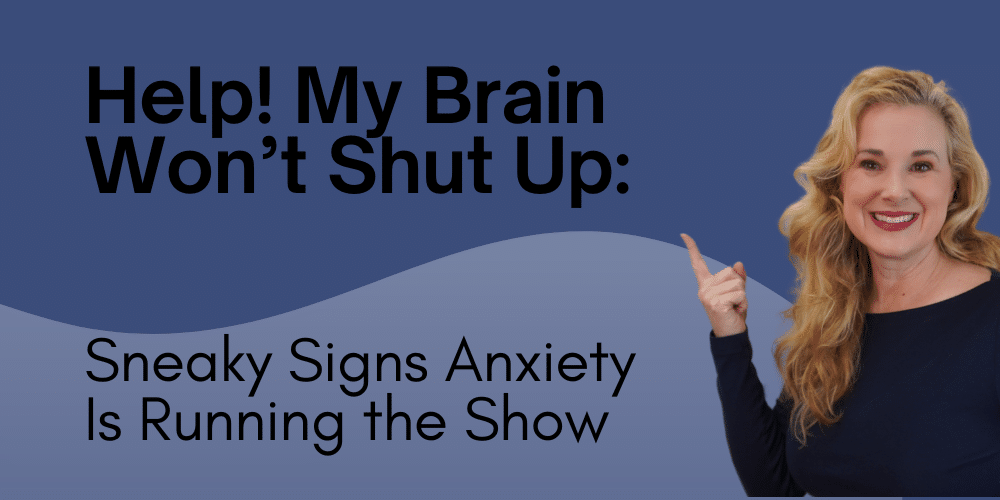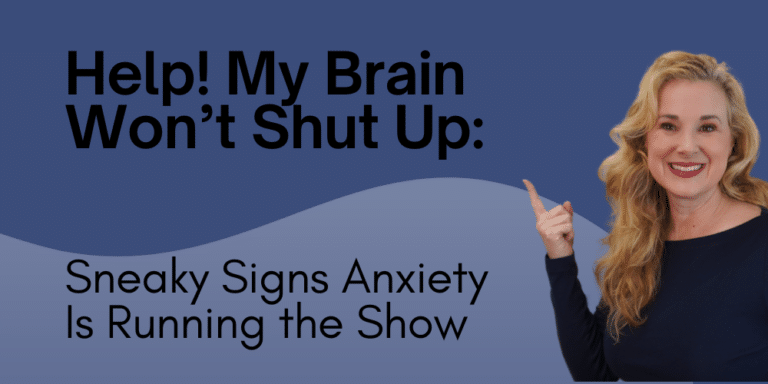
When you hear the word anxiety, you might picture someone pacing, biting their nails, or frantically worrying about worst-case scenarios. But what if anxiety doesn’t always look like that? What if anxiety is sneaky, showing up in ways that make you second-guess whether it’s even anxiety at all?
As a woman over 40, you might think you’re just tired, stressed, or going through a lot right now with kids, careers and aging parents. But if you’ve ever wondered why you can’t shake that restless feeling, or why your mind won’t stop racing even when things seem “fine,” this might be exactly what you need to hear.
In this blog, we’ll explore the subtle and not-so-subtle ways anxiety takes over your life. We’ll talk about what anxiety really looks like, why it can feel impossible to break free, and some tools to help you reclaim your peace.
The Sneaky Signs of Anxiety
Anxiety doesn’t always announce itself with flashing lights. Instead, it can quietly weave itself into your daily life until it feels “normal.” Here are some signs anxiety might be creeping in:
1. Your Mind Won’t Stop Racing
You replay conversations, worry about the future, and analyze every detail of the past. Even when you’re trying to relax, your brain keeps running like a hamster on a wheel. This constant overthinking isn’t just tiring—it’s anxiety.
2. You’re Always on Edge
Do you feel jumpy or easily irritated? Maybe you notice your heart racing, your stomach churning, or your shoulders tensing up for no clear reason. These physical signs are often your body’s way of saying, “I’m stuck in fight-or-flight mode.”
3. You’re Stuck in the “What Ifs”
What if I mess this up? What if something goes wrong? What if I’m not enough? Anxiety loves to plant seeds of doubt, leaving you spinning in worst-case scenarios. You might find yourself running through every possible outcome, as if worrying enough could somehow prevent disaster. Spoiler alert: It doesn’t, and it only makes you feel more drained.
4. You Overcommit and Then Feel Overwhelmed
Do you say “yes” to everything, even when you’re drowning in responsibilities? Anxiety often shows up as a need to please others or avoid conflict, leaving you overbooked and exhausted.
5. You Worry About What Others Think
That constant fear of disappointing people or being judged? It’s exhausting. Anxiety can make you feel like you’re walking on eggshells, overanalyzing every interaction, and carrying the weight of others’ expectations.
6. You Can’t Relax
When was the last time you truly felt calm? Anxiety can make it impossible to fully unwind. Even during moments of quiet, you might find yourself waiting for the other shoe to drop.
7. Your Body Speaks for Your Anxiety
Anxiety doesn’t just live in your head—it’s a full-body experience. Have you ever noticed:
- Migraines that knock you out when stress is high?
- Stomach issues like IBS flare-ups or digestive discomfort?
- Skin problems such as breakouts or rashes that seem to come out of nowhere?
Your body is your anxiety’s megaphone, shouting for attention when your mind won’t listen.
8. Your Anger Feels Uncontrollable
Anger is often a byproduct of anxiety. When your brain is running on high alert, even small irritations can feel like major threats. If you’re snapping at loved ones or feel rage bubbling beneath the surface, it’s worth asking: Is anxiety stoking the fire?
Why Anxiety Feels So Hard to Shake
Anxiety isn’t just in your head—it’s in your body, too. When your brain perceives a threat (even if it’s not real), it triggers your body’s fight-or-flight response. Over time, this constant state of hyper-alertness can become your “new normal,” making it harder to recognize or escape.
And here’s the tricky part: Anxiety often convinces you that it’s helping. “If I don’t worry about this, who will?” “If I relax, everything will fall apart.” These thoughts keep you stuck in a cycle of anxiety, even when it’s no longer serving you.
How to Cope With Anxiety
If any of this feels familiar, know that you’re not alone. Anxiety is incredibly common, and it’s also treatable. Here are a few strategies to start taking back control:
1. Ground Yourself in the Present Moment
When your thoughts spiral, grounding exercises can help you refocus. Try the 5-4-3-2-1 Technique: Name 5 things you can see, 4 things you can touch, 3 things you can hear, 2 things you can smell, and 1 thing you can taste.
2. Move Your Body
Physical activity helps release built-up tension and calm your nervous system. Even a short walk can make a big difference.
3. Practice Saying “No”
Overcommitting fuels anxiety. Start small by saying “no” to one thing this week that doesn’t serve you. Boundaries are self-care.
4. Try Breathing Exercises
Deep breathing sends a signal to your brain that you’re safe, helping to lower your heart rate and calm your body.
5. Challenge the “What Ifs”
When you find yourself spiraling into worst-case scenarios, try this: Ask yourself, “What’s the most likely outcome?” Follow it up with, “What’s one small thing I can do to feel more prepared?” This helps you regain perspective and focus on action rather than fear.
6. Tune In to Your Body’s Signals
Pay attention to recurring headaches, digestive troubles, or skin irritations. These aren’t just “annoyances”—they’re signs your body is under stress. Taking care of your physical health (hydration, sleep, balanced meals) can have a ripple effect on your mental well-being.
7. Seek Professional Support
Sometimes, anxiety needs more than self-help strategies. Therapy, especially approaches like online therapy such as EMDR or Brainspotting, can help you process the underlying causes of anxiety and develop long-term coping tools. If you’re looking for online anxiety therapy in Texas, know that support is just a call or click away. Schedule a free 30 minute consultation at keelyrodrigueztherapy.com.
When to Get Help
If anxiety is affecting your daily life—your relationships, your sleep, your ability to function—it’s time to reach out for help. Therapy can help you identify triggers, manage symptoms, and start living a life that feels lighter and more manageable.
You Deserve Peace
Anxiety might tell you that this is just the way life is, but that’s not true. You don’t have to stay stuck in the cycle of overthinking, worry, and exhaustion. With the right tools and support, you can find relief—and even joy.
If you’re ready to take the next step, I’m here to help. Whether it’s through EMDR, Brainspotting, or traditional talk therapy, we’ll work together to calm your mind, ease your anxiety, and help you feel like yourself again. For more information about high functioning anxiety, visit http://www.keelyrodrigueztherapy.com




